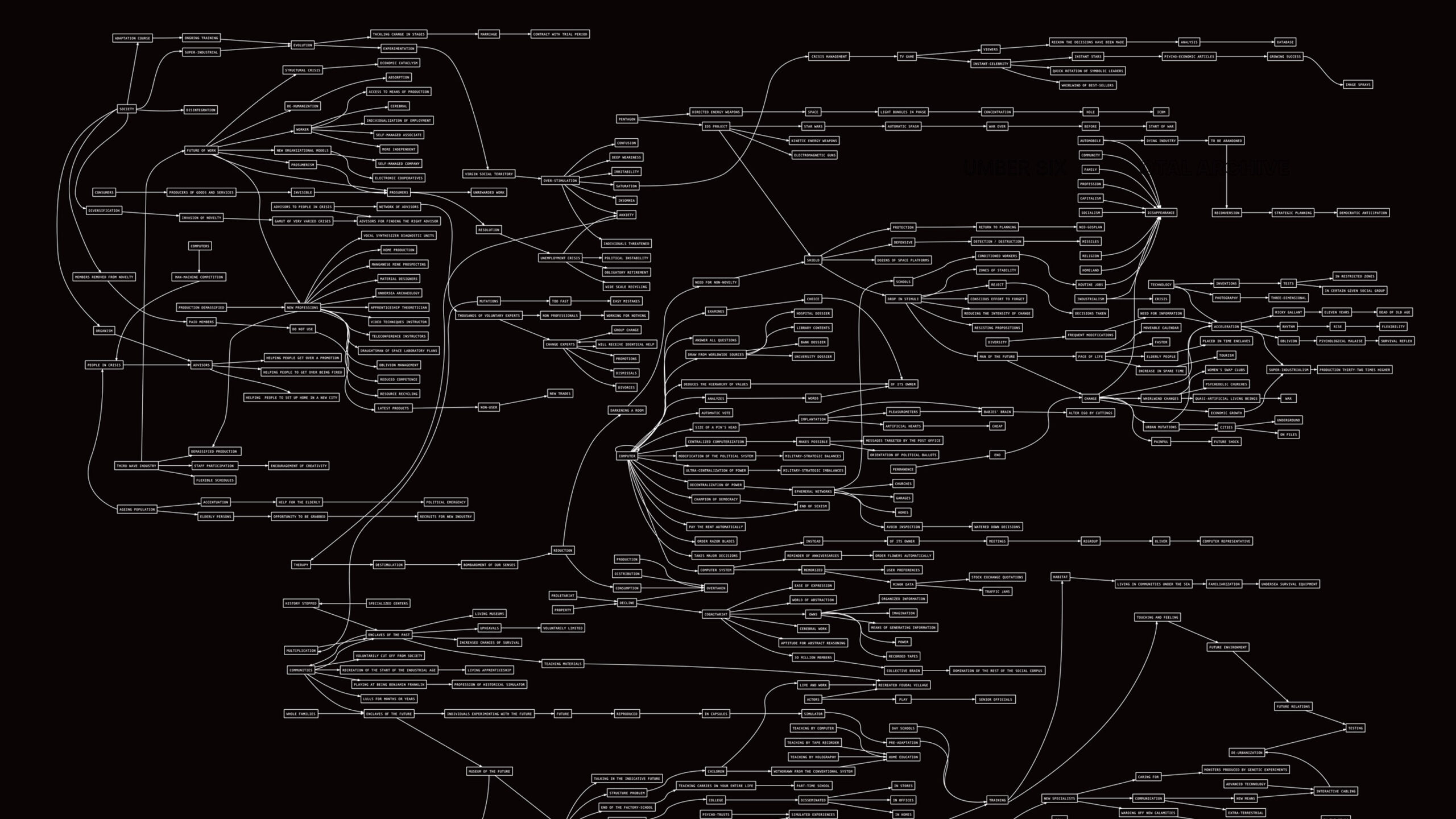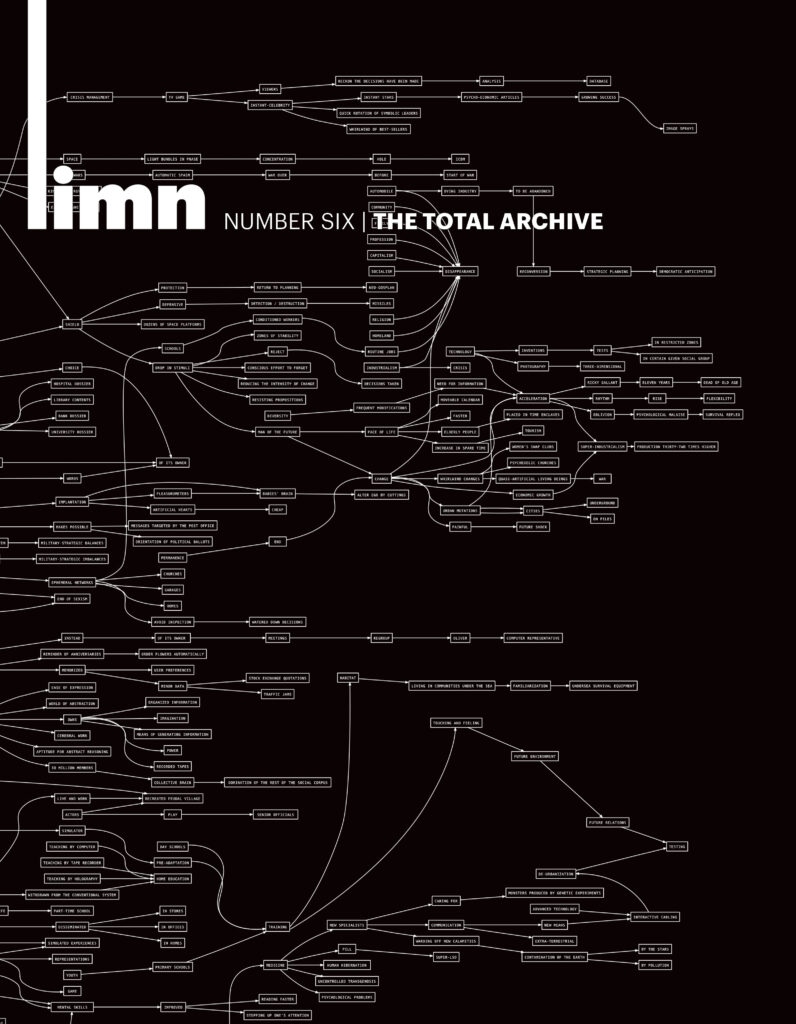
No. 6
The Total Archive

Vast accumulations saturate our world: phone calls and emails stored by security agencies; every preference of every individual collected by advertisers; ID numbers, and maybe an iris scan, for every Indian; hundreds of thousands of whole genome sequences; seed banks of all existing plants, and of course, books… all of them. Just what is the purpose of these optimistically total archives, and how are they changing us?
This issue of Limn asks authors and artists to consider how these accumulations govern us, where this obsession with totality came from and how we might think differently about big data and algorithms, by thinking carefully through the figure of the archive.
Published March 2016
In This Issue
Preface: The Total Archive
Archives make the future. Editors Boris Jardine and Christopher Kelty explore how archives govern us.
The Totality of True Propositions (Before) (2008-2009)
Like a cartographic exercise, Julien Prévieux traces the outlines of a completely uchronic parallel future, not without wit.
A Hoard of Hebrew MSS
Ben Outhwaite tells the stories of the people who immerse themselves in one of the most valuable total archives in existence—the Cairo Genizah.
How to be open about being closed
How does the Internet forget what it should not remember? Reuben Binns dives inside the rules for Biographies of Living Persons at Wikipedia and the right to be forgotten.
Unpacking Google’s Library
Google wanted to digitize all the world’s books but eventually abandoned that goal. Mary Murrell explores the rise and fall of one utopian library project and the emergence of new ones in its wake.
In the Name of Humanity
The total archive is already here, Balázs Bodó finds it hidden in the shadows and run by pirates.
Unending Archives
Aleph or Library? Work from the UA Artist Collective explores whether art can be an archive, or an archive art.
Fragments of Plague
Branwyn Poleykett, Nicholas HA Evans and Lukas Engelmann are rethinking the role of the visual in the creation of a total archive of the Third Plague Pandemic.
What Escapes the Total Archive
Rebecca Lemov relates how the stories in the a “database of dreams” leak out of the edges, and sometimes overwhelm totality with particularity.
Zebras, Blanks and Blobs
How can we work with vast digital collections? Artist Fabienne Hess explores the content and scale of an online image database
Just What Are We Archiving?
What kind of people will we become if we keep trying to archive everything? Geof Bowker reports from inside the Skinner Box.
Blood, Paper, and Total Human Genetic Diversity
Jenny Bangham explains how the attempt to create a supply of all possible types of human blood gave rise to genetic diversity research in the 20th century.
The Origins of Happiness
Boris Jardine tells the story of a little ladder intended to tell us what everyone wants. Where on the ladder are you?
The Bombing Encyclopedia of the World
How do you plan for the sudden onset of total war? Stephen J. Collier and Andrew Lakoff describe the construction of a vast collection of data about the vital, vulnerable systems of every nation in the world in the aftermath of World War II.
Alan Lomax and the Temple of Movement
Alan Lomax wanted to catalogue all human movement. Whitney Laemmli explores the high modern utopianism of the Choreometrics project.
Archiving Descriptive Language Data
Judith Kaplan explores the possibility of a new GOLD standard for archiving the world's endangered language data.
Selections from the Valaco Archive
Vadig de Croehling, Director of Ideation, Process, and Interface at the Group for Research on Experimental Accumulation and Speculative Archives (REASArch), offers a sampling of elements from one of his organization’s most inscrutable archival projects.
The Genomic Open
Leaders of the Human Genome Project promised a genomic total archive. Jenny Reardon argues that their quest inspired visions of freedom and imprisonment vital to understanding today’s ambivalences around open genomic data.
Duplicate, Leak, Deity
Lawrence Cohen de-duplicates the complex story of India’s Biometric Archive(s).
Keeping the Books
Finn Brunton goes inside the Bitcoin blockchain to explore the weirdly meticulous collective archive, and how it might someday govern us.
Exhibit: The Entropy Archives
What does a perfectly random archive look like? Finn Brunton explains.